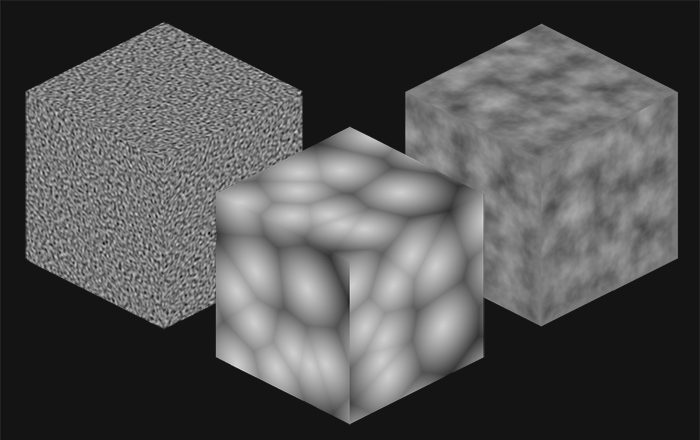/
Noise
Noise
Description
The Noise node allows you to procedurally generate many different types of noise, including Gaussian (or white) noise, Clouds (or Perlin) noise, and many types of Cell (or Voronoi) noise.
Users have control over the look and distribution of the noise via the node’s properties, some of which are specific to each noise type. A detailed description of what each property does is at the bottom of this page.
The node outputs a Bitmap texture with the generated noise, at a resolution defined by the user via the Dimensions property.
Usage
To get started using the Noise node, follow these steps:
- Create a new Noise node on the Node Graph. To do so, move the mouse into the Node Graph, press Space, and choose Noise. Alternatively, drag the Noise node from the Node Library onto the graph. It can be found in the Procedural category.
- Select the node by left-clicking it in the Node Graph. The node’s properties display in the Properties window.
- Navigate to the Properties window, and choose the Noise Type that you wish to generate.
- Set the Dimensions of the noise to your desired output texture resolution.
- Adjust other properties of the node to produce the desired noise pattern. For reference on available properties, see the Node Reference section below.
Node Reference
| Node category | Procedural |
|---|---|
| Node execution style | Automatic |
Ports
| Output Type | Description |
|---|---|
| Bitmap | The noise texture the node generates from its properties. |
Properties
| Property/Setting | Description |
|---|---|
| Noise Type | Choose the type of noise this node generates. The options are:
|
| Dimensions | Select the dimensions of the output texture of this node, in pixels. You can pick one of the preset options from the dropdown, or select Custom and specify your own values. The maximum supported dimensions for the output texture are 8192x8192. You can adjust the horizontal and vertical dimensions independently of each other by disabling the Link button to the left. |
| Scale | The value which determines the relative scale of the noise, irrespective of Dimensions. Smaller values produce finer noise, or noise with more cells/elements. Larger values produce noise with less cells/elements. |
| Disorder | The amount of variation the Noise node applies to the elements it generates. At 0, cellular types of noise generate nearly perfect square cells. At higher values, the node applies more variation to how individual cells are distributed or rotated. |
| Attenuation | The value (min: -1, max: 2) which determines how the different grayscale values in the noise blend together. Smaller values will produce finer noise that looks more grainy (similar to Gaussian). Larger values will produce noise that looks more blurred together. This property only becomes available when Clouds is selected as the Noise Type. |
| Color Seed | This seed value determines the random distribution of colors in the noise. You can modify this value by hand, or use the slider to select one. This property only accepts numeric values. This property only becomes available when Cells (Colored) is selected as the Noise Type. |
| Black and White | When enabled, the node generates noise made up of solid grayscale values rather than solid colors. This property only becomes available when Cells (Colored) is selected as the Noise Type. |
| Non Square Expansion | When enabled, the property prevents the output texture from stretching when the Dimensions are set to a non-square ratio. This property only becomes available when one of Cells (Bubble), Cells (Sharp), Cells (Colored), or Crystal is selected as the Noise Type. |
| Line Thickness | This value (min: 0, max: 0.5) determines the thickness of the lines separating the individual cells in the generated noise pattern. This property only becomes available when Cells (Sharp) is selected as the Noise Type. |
| Invert | Enable to invert the black and white or color values in the output noise texture, depending on Noise Type. This property only becomes available when one of Cells (Bubble), Cells (Sharp), Cells (Colored), or Crystal is selected as the Noise Type. |
| Seed | The seed value that the node uses to randomise noise generation. You can modify this value by hand, or click the New Seed button to randomly generate a new value. This property only accepts numeric values. |
, multiple selections available,
